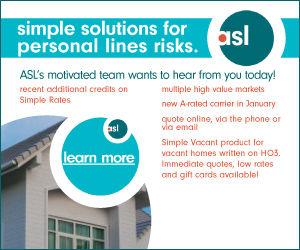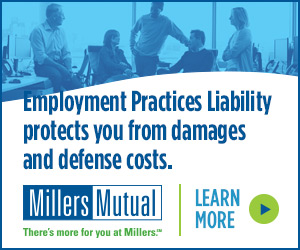Understanding Extended Reporting Coverage for Professional Liability Insurance Agencies
Print this Article | Send to Colleague
Understanding Extended Reporting Coverage for Professional Liability Insurance Agencies
by Linda S. Loving, CIC, AISM, AIAO
VFSC Executive Vice President
Most professional liability policies for insurance agencies (E&O) are written on a claims-made basis. For a claim to be covered, the claim must be first made and reported against the policyholder to the insurance company during the policy period. If a policy expires and a claim is thereafter made, the agency will not have coverage under that policy. Coverage is provided for claims made policies only if such claims arose from acts or omissions occurring during an insured period and reported before the extended reporting period ends. Some policies provide an automatic 60-day extension reporting period after the policy is terminated.
What is an extended reporting period endorsement?
An insurance agency’s exposure for claims arising from professional services performed during a particular policy period extends well past the expiration of the policy period. This exposure, often referred to as “tail exposure,” requires coverage for this exposure provided throughout an extended reporting period.
The ERP only covers claims arising out of professional services rendered prior to the expiration or termination of the policy that are made and reported subsequent to the policy expiration or termination date and prior to the end of the extended reporting period’s termination date. The ERP never covers any services performed after the termination of the policy term.
When you might need an ERP
Every agency has a life cycle. An agency might be acquired by, or merged with, another agency. Agency owners may retire and decide to close their agency. An individual may leave one agency for another or to start a new agency. Other reasons when an ERP may be needed are: the advancement of a retroactive date, renewal of coverage on other than a claims-made basis, or the exclusion of existing coverage from the policy when the policy remains in effect or was replaced. These changes require special protection, and should be discussed with your E&O insurance advisor.
An agency that is acquired by or merged with another agency should understand what requirements are stated in their buy/sell agreement regarding who is responsible in the event a professional liability claims should arise. If the predecessor agency is NOT assuming liability for the acquired agency, the acquired agency needs to purchase an ERP in the event a claim arises after the sale. If the predecessor agency IS assuming liability for the acquired agency, coverage would be provided under the predecessor agency as long as they continue E&O coverage without any lapse.
Agencies that simply close shop or dissolve do not extinguish the potential for claims.
These agencies need to purchase an ERP in the event a claim is made after the expiration of their E&O policy.
What ERP Options Are Available
Most E&O policies contain a provision for an “automatic” 60-day ERP in the event of a cancellation or non-renewal. This gives the agency a little time to secure an Extended Reporting Period endorsement for the period of time they feel is sufficient for their exposure.
The Optional Extended Reporting Period provision found in most E&O policies provide an insured with options to purchase ERP’s of varying length. The cost is generally a multiple of the last annual policy premium and depends upon the length of time selected for the extended reporting period.
A purchased ERP is not tacked onto the automatic 60-day period, but is a concurrent period that can extend the protection of the policy from claims related to services provided before the termination of the policy.
Written notice and premium payment generally is required no later than 60 days after cancellation or nonrenewal and the premium is fully earned and cannot be changed.
Separate limits of liability equal to that specified in the Declarations or in the latest renewal endorsement applies without diminution because of any prior payment under the policy. Insurance afforded under the ERP is excess over any other valid and collectable insurance available under policies in force after the ERP starts.
An ERP is not an option in the event the policy was cancelled or non-renewed for non-payment of premium.
Few E&O policies provide an unlimited time period to report claims. Of special note to our Westport E&O policyholders, their form does provide an unlimited ERP option at no additional premium following the cancelation or non-renewal under certain circumstances.
Final Comments
It is imperative that you communicate with your insurance advisor when, and if, there are any changes such as mergers, acquisitions, change in ownership, or material changes so they can help you secure the proper coverage needed. Often, there are provisions in your policy where you are required to make such notification within a certain number of days.
When trying to determine the length of an ERP you should purchase, it is recommended that you have a discussion with your attorney as they have the best picture of what your needs are, what contracts are in place, etc. The simple advice is to purchase as long a tail period as possible. Since many of the underlying policies that an agency sells are written on an occurrence basis, errors & omissions claims can easily arise years after the alleged error, not to mention that the statute of limitations for a professional liability claim itself can be rather lengthy in some states.
Linda Loving is the Chief Operating Officer of IIAV and Executive Vice President of VFSC. She has been with the Association since 1985. Before joining the Association, Linda worked with the Assigned Risk Plan, Alfa Insurance Company and a couple of local independent insurance agencies in the Richmond area. Linda is licensed in P&C and Life and Health. She obtained her CIC in 1987 and earned her AISM and AIAO designations while working at the IIAV. Linda is responsible for the internal operations of the IIAV with a primary focus on the growth and success of the for‐profit division of the association which handles the Errors and Omissions and other insurance products and services. Linda is a certified Continuing Education instructor in Virginia specializing in Errors and Omissions.



